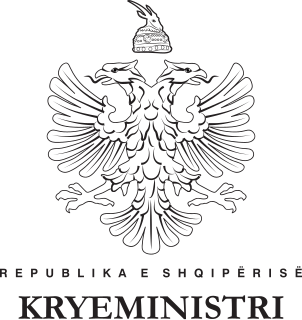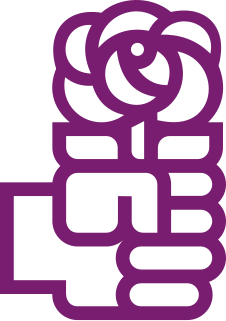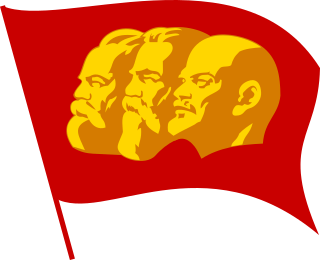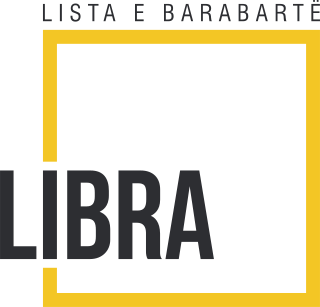
The Prime Minister of Albania, officially styled the Prime Minister of the Republic of Albania, is the head of government of the Republic of Albania and as well the most powerful and influential person in Albanian politics. The Prime Minister holds the executive power of the nation and represents the Council of Ministers and chairs its meetings.

The Socialist Party of Albania, is a social-democratic political party in Albania; it gained power following the 2013 parliamentary election. The party seated 66 MPs in the 2009 Albanian parliament. It achieved power in 1997 following a political crisis and governmental realignment. At the 2001 parliamentary election the party secured 73 seats, which enabled it to form a government. At the general election of 3 July 2005, the Socialist Party lost its majority and the Democratic Party of Albania (PD) formed the new government, having secured, with its allies, a majority of 81 seats.

The Social Democratic Party of Albania is a minor social-democratic political party in Albania. The party held seats in Parliament between 1992 and 1996, and again from 1997 until 2009. It is currently led by Skënder Gjinushi, a former Minister of Education (1987–1991) and Speaker of Parliament.

The Liberal Democratic Union is a political party in Albania.
The Unity for Human Rights Party is a social-liberal political party in Albania supporting the Greek minority. Founded in 1992, it represents Albania's minorities and is mainly related to the Greek minority, and is the political continuation of Omonoia. It works with Omonoia, MEGA and other Greek parties in Albania at national elections, under a Greek bloc. The party is currently led by Vangjel Dule, who held the party's only seat in Parliament until 2017.

Pro-Europeanism, sometimes called European Unionism, is a political position that favours European integration and membership of the European Union (EU). It includes the more radical European federalists, who seek to create a single superstate known informally as a United States of Europe. A related term is "Europhile".

The Party of Labour of Albania (PLA), sometimes referred to as the Albanian Workers' Party (AWP), was the vanguard party of Albania during the communist period (1945–1991) as well as the only legal political party. It was founded on November 8, 1941 as the Communist Party of Albania, but its name was changed in 1948. In 1991, the party was succeeded by the Socialist Party of Albania. For most of its existence, the party was dominated by its First Secretary, Enver Hoxha, who was also the de facto leader of Albania.
Albanians are the largest ethnic minority in the Republic of North Macedonia. Of the 2,022,547 citizens of North Macedonia, 509,083, or 25.2%, are Albanian according to the national census of 2002. The Albanian minority is concentrated mostly in the western, north-western and partially middle area of the country with small communities located in the south-west. The largest Albanian communities are in the municipalities of Tetovo, Gostivar (66.7%), Debar (58.1%), Struga (56.8%), Kičevo (54.5%), Kumanovo (25.8%) and Skopje (20.4%).

North Macedonia elects on national level a head of state - the president - and a legislature. The president is elected for a five-year term by the people. The Assembly of the Republic of North Macedonia (Sobranie) has 120-123 members, elected for a four-year term, by proportional representation. North Macedonia has a multi-party system, with numerous parties in which no one party often has a chance of gaining power alone, and parties must work with each other to form coalition governments.

The Social Democracy Party of Albania is a Social democratic Albanian political party. It was established in 2003. At the elections in July 2005 it won two seats in Parliament and its leader is Paskal Milo.

The Socialist Movement for Integration is a social-democratic political party in Albania. The LSI was formed on 6 September 2004 when Ilir Meta, former Prime Minister of Albania, broke from the Socialist Party of Albania (PS). Through the use of the term "movement", LSI attempts to give the message that it is open and inclusive. The other reason for using this term is its intention to differentiate itself from the other parties. LSI employed the one member, one vote system in March 2005 to elect its leader, Ilir Meta.

The Parliament of Albania or Kuvendi is the unicameral representative body of the citizens of the Republic of Albania; it is Albania's legislature. The Parliament is composed of not less than 140 members elected to a four-year term on the basis of direct, universal, periodic and equal suffrage by secret ballot. The Parliament is presided over by a Speaker of the Parliament, who is assisted by at least one deputy speaker. The electoral system is based on party-list proportional representation. There are 12 multi-seat constituencies, corresponding to the country's administrative divisions.

Parliamentary elections were held in Serbia on 21 January 2007 to elect members of the National Assembly. The first session of the new National Assembly of the Republic of Serbia was held on 14 February 2007. The elections enabled the coalition of DS; DSS & G17+ to continue.

The fall of Communism in Albania, the last such event in Europe outside the USSR, started in earnest on December 1990 with student demonstrations in the capital, Tirana, although protests had begun earlier that year in other cities. The Central Committee of the communist Party of Labour of Albania allowed political pluralism on 11 December and the largest opposition party, the Democratic Party, was founded the next day. March 1991 elections left the Party of Labour in power, but a general strike and urban opposition led to the formation of a "stability government" that included non-communists. Albania's former communists were routed in elections in March 1992 amid economic collapse and social unrest, with the Democratic Party winning most seats and its party head, Sali Berisha, becoming president.
Spiro Ksera is an Albanian politician. He is the current Minister of Labor, Social Affairs and Equal Opportunities of Albania. He was initially a member of the Greek minority's Unity for Human Rights Party but later became a member of the Democratic Party of Albania.
The Party of the Chameria was a small, short-lived political party in Greece, which aimed to represent the Cham Albanians in the Greek Parliament. It was created by Ali Dino, a famous Prevezan cartoonist and MP.
The Green Party of Albania, is a political party in Albania that follows the traditions of Green politics and maintains a strong commitment to social progressivism. Albanian Green Party was created on December 15, 2007, and is a full member of Global Greens and European Green Party.

Hoxhaism is a variant of anti-revisionist Marxism–Leninism that developed in the late 1970s due to a split in the Maoist movement, appearing after the ideological dispute between the Communist Party of China and the Party of Labour of Albania in 1978. The ideology is named after Enver Hoxha, a notable Albanian communist leader.

The Libra Party or Equal List is a political party in Albania. It was founded in 2016.














